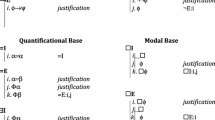Abstract
“The Craft of Formal Logic” is Arthur Prior’s unpublished textbook, written in 1950–51, in which he developed a theory of modality as quantification over possible worlds-like objects. This theory predates most of the prominent pioneering texts in possible worlds semantics and anticipates the significance of its basic concept in modal logic. Prior explicitly defines modal operators as quantifiers of ‘entities’ with modal character. Although he talks about these ‘entities’ only informally, and hesitates how to name them, using alternately the phrases ‘possible states of affairs’, ‘chances’, ‘cases’ or ‘peculiar objects’, he is nevertheless very clear that they should be the fundamental concept of any theory of modality as a form of quantity. Without the assumption that modal operators quantify over such modal objects, the modal system will be incapable of distinguishing an actually true proposition from a necessarily true one. Due to the fact that Prior never made any direct reference to this theory in his subsequently published papers, it remained largely unknown. The comparison of “The Craft” with some of his papers on tense logic suggests that this early theory of modality underlies his later work on temporality.
Similar content being viewed by others
Notes
“The Craft of Formal Logic” is kept in the Bodleian Library in Oxford, as part of the collection of Prior’s manuscripts. When quoting from it, I use the acronym CFL.
I want to acknowledge the anonymous reviewer for suggesting this interpretation of the factual proposition.
There is no direct reference to Łukasiewicz’s work in “The Craft”, and it may be that Prior learnt of his notation from Bochenski’s Precis de logique mathematique (1948), which he was using as a textbook at that time. However, in his Prior (1952a) article “Lukasiewicz’s Symbolic Logic”, Prior reviewed the following three titles by Łukasiewicz: Aristotle’s Syllogistic from the Standpoint of Modern Formal Logic (1951); “The Shortest Axiom of the Implicational Calculus of Propositions” (1948) and “On Variable Functors of Propositional Arguments” (1951).
When attributing these symbols to Robert Feys, Prior quotes his (1950) article “Les Systèmes Formalisé des Modalités Aristotéliciannes”. Feys, who also uses the Polish notation, lists the symbols on p. 479.
No detail about this reference exists in “The Craft”, but in Formal Logic, Prior includes Wallis (1687) Logicae in the bibliography. According to the footnote on p. 107 of Formal Logic, Wallis’s account of hypotheticals, which was adopted by many 19 century logicians, like Whately, de Morgan, Jevons, Peirce and Keynes, reduces the form ‘If P then Q’ to ‘Every case of P is a case of Q’, for the purpose of incorporating the propositional logic in Aristotelian syllogistic.
Prior does not give any reference for Anderson’s position on modality and explains in a footnote (CFL, p. 741, n.) that he has learnt about this theory from conversations and correspondence with J. L. Mackie. It is most likely that Prior here talks about John Anderson, the University of Sydney professor whom he met at a philosophy conference in Sydney in August 1951, (at the time when he was probably still working on this chapter of “The Craft”). Prior published his impressions of the conference, and particularly of Anderson, in the article “This Quarter” in Landfall (Prior 1952b).
Prior identifies this theory in W. Kneale’s Probability and Induction (Kneale 1949), and associates it in general with the school of Cook Wilson. (CFL, p. 745)
Franciscan Studies 1958, pp. 105–120. Prior specifies the time when this paper was written in his Past, Present and Future, on p. 34. There he says that he had treated the logic of past and future more systematically in his presidential address “The Syntax of Time Distinctions” given in 1954, and in the 1955 paper “Diodoran Modalities”, which he had written by early 1954 (Prior 1967, p. 34). He seems to be suggesting here that he had worked on the address after finishing “Diodoran Modalities”, which would be sometime in mid-1954.
References
Bochenski, J. M. (1948). Precis de logique mathematique. Bussum, Pays-Bas: F.G.Kroonder.
Chisholm, R. M. (1946). The contrary-to-fact conditionals. Mind, 55(220), 289–307.
Copeland, B. J. (1996). Prior’s life and legacy. In B. J. Copeland (Ed.), Logic and reality. Oxford: Oxford University Press.
Copeland, B. J. (2002). Genesis of possible world semantics. Journal of Philosophical Logic, 31(2), 99–137.
Feys, R. (1950). Les systèmes formalisés des modalités aristotéliciennes. Revue Philosophique de Louvain. Troisième série, 48(20), 478–509.
Geach, P. T., & Kenny, A. J. P. (1976). ‘Introduction to A. N. Prior. In P. T. Geach & A. J. P. Kenny (Eds.), The doctrine of propositions and terms. London: Duckworth.
Kneale, W. C. (1949). Probability and induction. Oxford: Clarendon Press.
Prior, A. N. (1952a). Lukasiewicz’s Symbolic Logic. Australasian Journal of Philosophy, 30(1), 33–46.
Prior, A. N. (1952b). This quarter. Landfall, 6(1), 49–53.
Prior, A. N. (1955). Formal logic. Oxford: Clarendon Press.
Prior, A. N. (1958). The syntax of time distinctions. Franciscan Studies, 1958, 105–120.
Prior, A. N. (1967). Past, present, and future. Oxford: Oxford University Press.
Wallis, J. (1687). Institutio logicae, Oxford.
Will, F. L. (1947). The Contrary-to-Fact Conditionals. Mind, 56(223), 236–249.
Acknowledgments
I would like to thank J. Copeland for talking me into looking at “The Craft” and for providing a copy of the manuscript. Also, I want to acknowledge the highly valuable suggestions and helpful comments of the anonymous reviewer.
Author information
Authors and Affiliations
Corresponding author
Rights and permissions
About this article
Cite this article
Markoska-Cubrinovska, A. Possible worlds in “The Craft of Formal Logic”. Synthese 193, 3459–3471 (2016). https://doi.org/10.1007/s11229-015-0912-0
Received:
Accepted:
Published:
Issue Date:
DOI: https://doi.org/10.1007/s11229-015-0912-0



